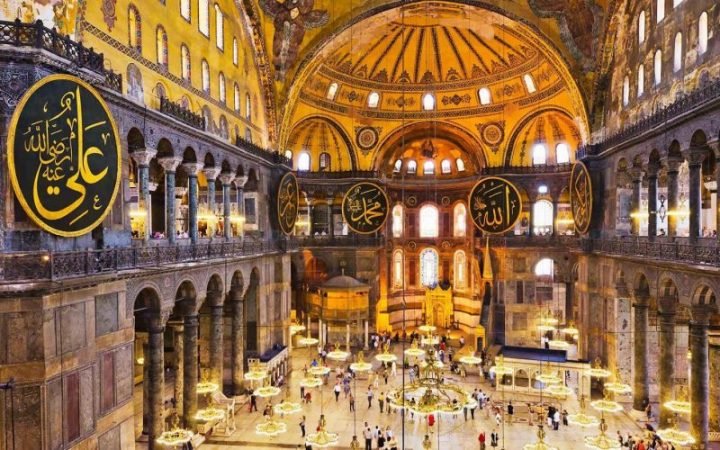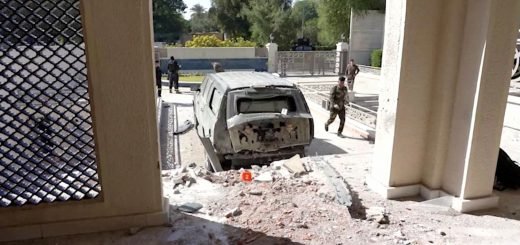Interview of Christiane Waked on the conversion of Hagia Sophia into a mosque

Recently Turkey converted Hagia Sophia museum into a mosque. With this action, Turkey has added another chapter to the history of Hagia Sophia which was at different points of time a church, a mosque, a museum and now again a mosque. This step from Turkey is likely to have repercussions at regional and global levels. Hagia Sophia is one of the major instruments for Turkish President Recep Tayyip Erdogan to consolidate his position at home and at the same time increase Turkey’s influence in neighbourhood and beyond. Political analyst and columnist Christiane Waked, who has extensively covered the Middle East and North Africa region, spoke to Niranjan Marjani, the Consulting Editor of The Kootneeti Español, on various issues about Hagia Sophia.
What is the history of and background behind the entire Hagia Sophia issue?
Church of Holy Wisdom, Hagia Sophia was built by Justinian I, the Byzantine emperor on the site of a ruined basilica of the same name. Completed in 537, it was one of the largest dome structures in the world and served as the most important Orthodox Christian church for 900 years. After the capture of Constantinople by the Ottomans and after almost a millennium, the Byzantine Christian basilica was converted in 1453 by Mehmet II into a mosque. In 1934, Hagia Sophia was no longer a place of worship, neither Christian nor Muslim. Mustafa Kemal Atatürk, founder of modern Turkey and staunch secularist, has turned it into a “museum offered to humanity”. Two years ago, Turkish President Erdogan announced that he was against turning the church into a mosque. However, when the opposition IYI party suggested it, the ruling Justice and Development Party (AKP) refused and drafted a similar law to attract conservative votes and prevent IYI from obtaining them. Recently, Erdogan ordered the conversion of Hagia Sophia into a mosque after a court struck down a 1934 presidential decree that made it a museum. Soon after, Erdogan issued a presidential decree transferring the administration of the site from the Ministry of Culture to the Presidency of Religious Affairs, paving the way for its conversion.
Is there a reason why the Hagia Sophia was converted into a mosque at this point of time? Is there any domestic pressure on Turkish President Recep Tayyip Erdogan at the moment?
Hagia Sophia’s conversion is first and foremost a tactical communication operation that aims to hide the weaknesses of the Turkish president, whose image is beginning to crumble on the domestic political scene. Even before the Covid-19 crisis, the Turkish economy was in serious trouble. More than 2.5 million Turkish citizens have lost their jobs in one year, while at the same time the Turkish lira lost about 15 percent of its value against the dollar during the first half of the year. Meanwhile, the Turkish Central Bank has been using all of its net reserves to keep the Turkish lira stable. The economic situation and the mismanagement of the COVID 19 crisis have affected the Turkish street. Having lost Istanbul in local elections last year, the president’s political party, the Justice and Development Party, continued to slide in the polls. Recent polls show that support to the ruling Justice and Development Party (AKP) fell to 30 percent after the coronavirus, suggesting that Erdogan has lost many voters. The conversion of Hagia Sophia is a seduction movement to win votes from the conservative and nationalistic religious base. For more than 25 years since he became mayor of Istanbul, Erdogan has been working to make his historic mark and what better way to do that than to turn Hagia Sophia into a mosque again.

What impact will this have on Turkey’s neighbourhood and the Middle East and North Africa region?
Hagia Sophia’s conversion into a mosque has already upset the Christian community in general and the Greek Orthodox Church in particular. Hagia Sophia for many is more than a religious problem. It represents heritage and civilization. What President Erdogan did was erase the trace of the Byzantine Christian memory of Istanbul. Archbishop Ieronymos of Athens and of all Greece expressed his concerns, emphasizing that: “Insult and arrogance reach not only Orthodox Christianity or even Christianity as a whole, but all civilized humanity, any thinking human being, regardless of the religion”.
Hagia Sophia has a more positive impact not only in the region but throughout the world if it continues to be a museum that serves humanity as an inter-religious bridge between culture, a hand that unites East and West instead of creating a gap and stir emotions through provocation.
Leading the first Friday prayer in Hagia Sophia 86 years later, Ali Erbaş, the head of Turkey’s highest religious authority, read the khutbah (sermon) with a sword in his hand on the pulpit. This is a message to the world that political Islam spread through the sword throughout the world and will implement it again through the sword. Now more than ever, the message of secularism and coexistence must spread in a world that is now divided and weakened by Covid-19 and a collapsed economy. The first to be affected by turning Hagia Sophia into a mosque are Turkish citizens, as this is undermining Turkey’s position on freedom of religion and will further weaken minority rights in Turkey.
Is Hagia Sophia an excuse to compete with the Arab world since now Erdogan is talking about liberating the Al-Aqsa mosque from Israel? Does Erdogan consider Hagia Sophia as a path towards gaining supremacy in the Muslim world?
I can’t claim to know what Mr. Erdogan’s exact intentions are, but Turkey is already in a cold war with the United Arab Emirates, Saudi Arabia and Bahrain over Ankara’s support to Qatar after four Arab countries as well as the United Arab Emirates imposed sanctions on Doha in 2017 on its independent foreign policy. The United Arab Emirates and Turkish President Recep Tayyip Erdogan’s Justice and Development Party (AK) are ideologically opposed, especially as the latter supports the Muslim Brotherhood, while the United Arab Emirates presents itself as a bulwark against political forms of Islam. Sure, Hagia Sophia’s conversion is meant to deliver a message to the Arab street and show Erdogan as the saviour of Islam, but this kind of narrow thinking and bigotry is retrograde and does not serve Islam. It hurts their image more and I think most Muslims realize that. Today, more than ever, pluralism should be the narrative of a healthy world. As for Erdogan’s talk on the release of Al-Aqsa, it is close rhetoric to Iran’s threats against Israel that started in 1970 until today. Both Turkey and Iran support Hamas and Ankara through Hamas has increased its influence through religious groups in East Jerusalem. But the real threat does not come from Palestine, but from Turkey’s growing influence throughout the region. Turkey’s interference in Syria and Iraq, which is completely illegal and also in Libya, shows that Turkey is trying to take over a swath of the Mediterranean to avoid an Israeli-Greek pipeline agreement signed earlier this year. Turkey is trying to sabotage Israel’s interests and is certainly becoming a threat not only to Israel but to many countries in this region.
Will Turkey’s action on Hagia Sophia have any impact on its involvement in Syria and Libya? If yes, how?
It could help motivate its mercenaries and representatives in both Libya and Syria to nurture their cause in terms of ideology, although many of the young Syrians sent by Turkey to Libya are there for economic reasons, as they were promised a Turkish passport and a monthly salary of $1500. But for sure, Turkey has been using Muslim Brotherhood propaganda to influence young Syrian minds.
How would Turkey’s recent actions affect its standing as a member of the NATO?
Erdogan’s decision to revert to Hagia Sophia despite appeals from the NATO ally, the United States and Russia, not to do so, is somewhat of a challenge. The prolonged tensions between Greece and Turkey and the provocative behaviour of Turkey, which is violating the air and sea borders in Cyprus, as well as the recent crack with France after the incident between a French frigate and Turkish ships, are threatening the cohesion of NATO and their relation with the EU. The incident caused France to withdraw from the NATO operation, in part intended to impose a UN embargo on the supply of arms in Libya.
What are the possible consequences of these developments for Turkey?
A bad international image, Turkey did an ethnic cleansing last year against Kurds, Arabs and Christian minorities in northeast Syria. It is also sending young Syrians as mercenaries in Libya to create more chaos there and complicate the peace process. It turned Hagia Sophia, a symbolic monument for coexistence and peace into a mosque, etc. All of the aforementioned are giving the world reason to be afraid of Erdogan’s Turkey, which he leads with his fist internally and externally with ultra-nationalist speeches highlighted by a political-minded Islam. Turkey wants to become the centre of the Muslim world. This can lead to clashes with other powerful states like Russia, China, and even the EU. The recent Turkish-backed Azerbaijani aggression in Armenia was a sign that Turkey was flexing its muscles even in the southern Caucasus in the traditional Russian sphere of influence. But this could quickly counteract, in a recent MetroPoll poll last June, 43 percent of Turks believe Hagia Sophia’s media conversion is an attempt by the government to create an artificial agenda to distract from deepening economic problems and the Turks are no longer buying Erdogan’s speeches.

Christiane Waked is a Political analyst and columnist and has extensively covered the Middle East and North Africa region


















